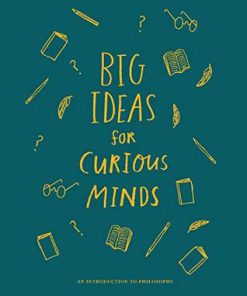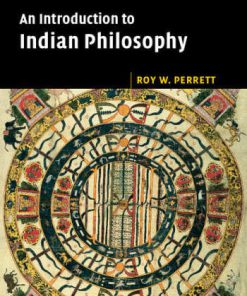Minds without fear philosophy in the Indian renaissance 1st Edition by Nalini Bhushan, Jay Garfield 0190672997 9780190672997
$50.00 Original price was: $50.00.$25.00Current price is: $25.00.
Minds without fear : philosophy in the Indian renaissance 1st Edition by Nalini Bhushan, Jay L. Garfield – Ebook PDF Instant Download/DeliveryISBN: 0190672997, 9780190672997
Full download Minds without fear : philosophy in the Indian renaissance 1st Edition after payment.

Product details:
ISBN-10 : 0190672997
ISBN-13 : 9780190672997
Author: Nalini Bhushan, Jay L. Garfield
Minds Without Fear is an intellectual and cultural history of India during the period of British occupation. It demonstrates that this was a period of renaissance in India in which philosophy–both in the public sphere and in the Indian universities–played a central role in the emergence of a distinctively Indian modernity. This is also a history of Indian philosophy. It demonstrates how the development of a secular philosophical voice facilitated the construction of modern Indian society and the consolidation of the nationalist movement. Authors Nalini Bhushan and Jay Garfield explore the complex role of the English language in philosophical and nationalist discourse, demonstrating both the anxieties that surrounded English, and the processes that normalized it as an Indian vernacular and academic language.Garfield and Bhushan attend to both Hindu and Muslim philosophers, to public and academic intellectuals, to artists and art critics, and to national identity and nation-building. Also explored is the complex interactions between Indian and European thought during this period, including the role of missionary teachers and the influence of foreign universities in the evolution of Indian philosophy. This pattern of interaction, although often disparaged as “inauthentic” is continuous with the cosmopolitanism that has always characterized the intellectual life of India, and that the philosophy articulated during this period is a worthy continuation of the Indian philosophical tradition.
Minds without fear : philosophy in the Indian renaissance 1st Table of contents:
1. The Tragedy of Indian Philosophy: Colonial Subjection and Contemporary Amnesia
1.1 A Colonial Subjectivity
1.2 The Predicaments of Indian Philosophy
1.3 The Predicaments of Indian Philosophers
2. Looking Backward: Reason, Cosmopolitan Consciousness, and the Emergence of Indian Modernity
2.1. The Vernacular and the Secular in Early Modern Indian Literature
2.2. From Poetry to Prose: The Case of the Karaṇam in South India
2.3. The Case of the Munshī in Mughal India
2.4. Reason and Secularity: The Court of Jehangir and the Age of Reason
3. The Company and the Crown: Macaulay’s India?
3.1. The Context of the Minute
3.2. Reading the Minute
3.3. A New Class?
4. On the Very Idea of a Renaissance
4.1 The Master Trope
4.2 Other Renaissance Tropes
5. Reform Movements: From Universality to Secularity in the Brahmo and Arya Samaj
5.1. Brahmo Samaj
5.2. Arya Samaj
5.3. Back to the Future
6. India Imagined: Contested Narratives of National Identity
6.1. Imperialists and Orientalists: The British Narrative
6.2. A. K. Coomaraswamy: Hybrid Heritage, Split Narratives
6.3. Vivekananda: Vedic Spiritual Unity
6.4. Tagore: Creating Aesthetic Unity
6.5. Gandhi: The Hind in Hind Swaraj
6.6. Nehru: A Quest for Civilizational Unity
6.7. Lajpat Rai—A Pluralist Nationalism
6.8. Sarkar and the Critique of National Essence
7. Anticipating India’s Future: Varieties of Nationalism
7.1. Varieties of Nationalism_ A Taxonomy
7.2. Aesthetic Nationalism_ A Manifesto
7.3. Besant’s Spiritual and Activist Nationalism_ Political Theosophy
7.4. Terrorism and the Trinity: Aurobindo’s Vision
7.5. The Pragmatic Voice: Nehru’s Middle Path
7.6. Nationalism Contested: The Tagore-Gandhi Correspondence
7.7. Parallel Contests: Debates about Nationalism in the Muslim Community
7.8. Coda: Nationalism and the Metaphysics of Freedom
8. Theorizing Swaraj: Politics and the Academy
8.1. Swaraj in Ideas
8.2. Gandhi’s Swaraj
8.3. Swaraj, Democracy, and the Renaissance Trope: Lajpat Rai’s Modernism and Bhagavan Das’s Traditionalism
8.4. Swaraj and Swadeshi in Art
8.5. Flushing the Toilets: Swaraj without Swaraj
9. The Cambridge Connection: Idealism, Modernity, and the Circulation of Ideas
9.1. Cambridge and India: British Neo-Hegelianism
9.2. Evangelizing for Hegel: Scottish Missionaries to India
9.3. Cambridge in India: Idealist Islam and the Aligarh Movement
9.4. Parallel Play: Idealism in Islam and in neo-Vedānta
9.5 Conclusion: Idealism and the Renaissance
10. Māyā versus Līlā: From Śaṅkaracārya to Einstein
10.1. Māyā and Līlā
10.2. The Reformed Māyāvāda of Swami Vivekananda
10.3. From Māyāvāda to Līlāvāda: The Project of Aurobindo’s The Life Divine
10.4. Aurobindo’s Critique of Māyā
10.5. Aurobindo’s Doctrine of Līlā
10.6. From the Ashram to the Academy
10.7. Conclusion
11. The Question of Subjectivity: Neo-Vedānta in Academic Philosophy
11.1. Context
11.2. A. C. Mukerji (1888–1968)
11.3. K. C. Bhatacharyya (1875–1949)
11.4. Conclusion
12. Indian Ways of Seeing: The Centrality of Aesthetics
12.1. Introduction
12.2. The Philosophers
12.3. The Art Worlds of Bombay and Calcutta
4. Conclusion
13. The Triumph of Indian Philosophy: Thinking Through the Renaissance
People also search for Minds without fear : philosophy in the Indian renaissance 1st:
is it possible to have no fear
how to feel no fear
how to have no fear
minds without a face
minds without purpose
Tags: without fear, philosophy, the Indian renaissance, Nalini Bhushan, Jay Garfield
You may also like…
Politics & Philosophy - Asian Philosophy
The Routledge History of Indian Philosophy Bilimoria Purushottama 1317356179 9781317356172
Politics & Philosophy - General & Miscellaneous Philosophy
Big Ideas for Curious Minds An Introduction to Philosophy The School Of Life
Computers - Programming
Politics & Philosophy - Anthropology
History - European History
Politics & Philosophy - Anthropology
Education Studies & Teaching
The Future of Higher Education in India 1st edition by Sudhanshu Bhushan 9813290609 9789813290600












